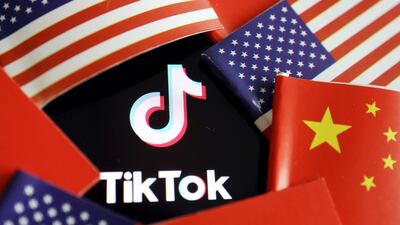TikTok on Monday sued President Donald Trump's administration over his order banning transactions in the US, calling it a pretext to fuel anti-China sentiment as he seeks re-election.
TikTok and its owner, ByteDance, rejected White House claims that it was a national security threat, saying they had taken "extraordinary measures to protect the privacy and security of TikTok's US user data".
They said Mr Trump's executive order on August 6 was a way to further his "broader campaign of anti-China rhetoric" before the November 3 US presidential election.
"We do not take suing the government lightly," TikTok said in a blog post.
"But with the executive order threatening to bring a ban on our US operations, we simply have no choice."
TikTok and ByteDance are seeking a permanent injunction to block Mr Trump from enforcing his order.
They say the Trump administration breached their constitutional right to due process by banning the company without an opportunity to respond.
They say he lacked the proper legal authority to issue the order and that he misused the International Emergency Economic Powers Act, which allows the president to regulate international commerce in a national emergency.
Mr Trump in May 2019 invoked that law to stop what he claimed were attempts by foreign telecommunications companies to commit economic and industrial espionage against the US.
The lawsuit filed in Los Angeles Federal Court names Mr Trump, the US Department of Commerce and Commerce Secretary Wilbur Ross as defendants.
Mr Trump had for weeks complained that TikTok was a national security threat that might share information about users with the Chinese government.
His order called for banning transactions with the app after 45 days.
Mr Trump issued another executive order on August 14 giving ByteDance 90 days to divest TikTok's US operations and any data TikTok had gathered in America.
ByteDance had acquired Shanghai-based video app Musical.ly in a $1 billion (Dh3.67bn) transaction in 2017, and relaunched it as TikTok the next year.
TikTok, best known for short videos of people dancing, which are popular among teenagers, had 92 million monthly users in the US as of June and 689 monthly users globally as of July, the lawsuit says.
Under a law introduced in 2017 under President Xi Jinping, Chinese companies have an obligation to support and co-operate with Beijing's national intelligence work.
But TikTok said Mr Trump's order was not rooted in genuine national security concerns or supported by the emergency he had declared a year earlier.
ByteDance has been in talks to sell TikTok's North American, Australian and New Zealand operations to companies including Microsoft and Oracle.
Those assets could be worth up to $30bn, insiders say.
Before buying TikTok, ByteDance had not sought approval from the Committee on Foreign Investment in the US, which reviews acquisitions for potential national security risks.
The committee later opened an investigation and on July 30 found national security risks associated with the purchase.

